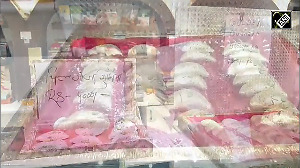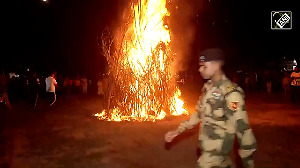Six men, all Indians, find themselves at the receiving end of a phenomenon that applies to police forces anywhere in the world.
Whenever something goes wrong, cops tend to home in on people with past records of related skulduggery -- the concept that perhaps a guy who once committed a crime may be trying to go straight is alien to cop mentality.
The Los Angeles cops are no different, as Major (Amitabh), Ajju (Sanjay Dutt), Marc Isaak (Suniel Shetty), Andy (Kumar Gaurav), Baali (Mahesh Manjrekar) and Mak (Lucky Ali) find out to their cost. The six meet up in a holding cell, and the reason they are there is summed up in a throwaway line: These policemen think we are talcum powder -- any time they itch, they reach out and grab us!'
From this predicament -- and the knowledge that they can never lead straight lives -- comes one final, desperate plan. Pull off one gigantic heist, they think, make a pot of money, and use it to re-script the rest of their lives.
They identify the target -- the Service Bank, where the LA police bank and which, by virtue of the fact that policemen themselves are customers, is less well guarded than others. I mean, who would want to stir a hornet's nest by stealing from the cops themselves, right?
So they plan and carry out the heist -- and without warning, the wheels come off their plot. Six men with one common characteristic, that they can never bring themselves to trust someone, realise that one of them is a traitor, an informant.
Who? Why? And what do the other five do about it? That is as much of the story of Kaante as can be given here without playing spoiler.
The film has quite a few things going for it.
Firstly, precedent: It is unabashedly inspired by Reservoir Dogs, the edgy 1992 underworld thriller with which Quentin Tarantino made his bones for both script and direction. But being inspired is not a crime. Tarantino himself was inspired by a film out of, and about, Hong Kong.
Secondly, technical excellence: Dialogues (Milap Zhaveri) are considerably sparser than is the norm for Hindi films, and occasionally, it sparkles with wit. Take, for instance, the scene where Major is talking the gang through the intricacies of the plan. At one point, he warns his team to play it cool, to not get trigger-happy. "I don't want innocent bodies lying around," he warns.
"Why," asks Baali in the stammer that is his trademark, "are bodies always innocent?"
The cinematography (Kurt Brabbee) and visual effects (George Merkert) have bragging moments. Jerry Ross and Akbar Gabbana team up to create costumes reflective of LA cool, and despite a tendency to go a touch over the top, manage to carry out their brief. Neisha Folkes' choreography has its moments -- moments that, in fact, trigger memories of the Rekha dance number in Feroz Khan's Jaanbaaz.
And finally, the six stars themselves -- each has a character etched for him by the script and director, and all six of them stay within those parameters. It is also a plus that the director has refrained from the temptation to let Amitabh hog a substantial number of the frames -- a rather common malaise in films featuring the Big B, to the detriment of the film in toto.
So is this, as a whopping 67 per cent of the 7000-odd readers who have taken the Rediff Poll at the time of writing this, the film that will break Bollywood's box office jinx?
Somehow, I think not. I reckon that though the film tries to be different from run of the mill Bollywood kitsch, its own inherent Indian-ness', and a few glaring flaws, will ultimately drag it down.
The film is self-indulgent, for one. When the FX guys and cinematographer team up to create one good shot, they then go overboard and repeat, or stretch, it ad nauseum.
An instance in point -- not the only instance in point -- is where the gang members get their weapons. It starts with a shot of one of them raising the gun, which is seen in blur. But then, for what seems like eternity, it is just one guy after another doing the same darn thing, until you want to scream, enough!'
The same is the case with the wisecracks. Manjrekar's Baali has been conceived as an over the top character with a motor-mouth. The catch is, instead of his wise-cracks relieving tension or even adding to it (as, for instance, the Tarantino script did so brilliantly), the profusion of gags, coupled with an over-emphasis on a manic style of acting, actually detracts from the way the story flows off the screen.
The same, again, is the case with that inevitable component of a Hindi film, songs. Just when the planning has been completed and tension is beginning to build, lo, the six break into a totally unnecessary and ultimately deflating number.
Or take another must-have component, sentiment. There is a point in the film, early on, when Suniel Shetty's character bids goodbye to his club-dancer girlfriend (played by Malaika Arora). And you think, ah, thank goodness, they've gotten the women out of the way early, now the focus can be the thriller, the whole thriller and nothing but the thriller.
But then comes the second half. Just when the six men who've just survived a tremendous (and overlong) shootout with the LAPD, and have gone to ground are wondering who among them the betrayer is, wondering too how to get out of the grave they have dug for themselves, what do you get? A tension easing detour into sentiment as exemplified by a dying wife, a reunited pair of lovers and, lest we forget, a song or is it two?
There are obvious logical holes. Like for instance, why in hell would a team of would-be bank robbers want to draw attention to themselves by going up on a rooftop and blazing away, for half an hour, with their guns on the pretext of trying them out? What, LA is full of deaf people, ditto cops?
Similarly, assuming your plans have been leaked to the cops and you know -- or can infer -- it, why would you then make a beeline to the hideout that was part of your original plan, and then remain there for hours?
Surely, if an informant had told the cops about the plan to rob the bank, he would also have told them about where the gang planned to hide? Again -- given that the six plan the heist because they are already notorious and because the cops keep picking them up on suspicion of having committed any and every crime going down, would any of the six, after being caught red-handed during the bank heist, then wander around LA for hours with no attempt at disguise?
Would a notorious criminal with every cop's eye on him head straight to his regular address, a dance club, for a tryst with his girlfriend, or to his own home to shed a tear for a dead wife? You reckon the LAPD wouldn't have thought of the obvious, and posted men to watch all known haunts of the obvious suspects?
Such exercises in illogic are many -- but so what? Titanic, one of the most successful of films, has over 100 such flaws. What defeats this film, in the ultimate analysis, is that old bugbear of Hindi filmmakers -- pacing.
Rather than grab the audience early and hang on for dear life, the film engages your attention, then lets you go (to the loo, to the concession stand for another helping of popcorn, back to the loo), too many times to qualify as an edge of the seat thriller.
A more taut script, a little less of indulgence in directing, a tad more ruthlessness in editing, and this film could have pulled off a badly needed box office heist. In the event, all that Kaante does is prick the balloon of hope that we cling to each time a big budget film rolls out of the starting gate.
ALSO SEE:
Kaante Special






 © 2025
© 2025